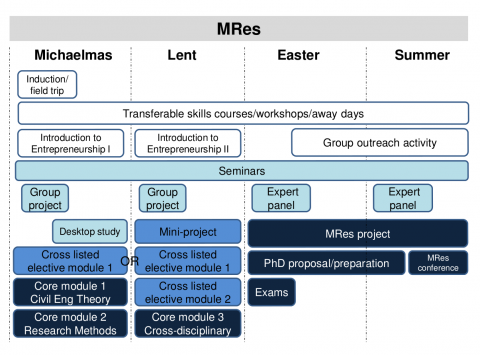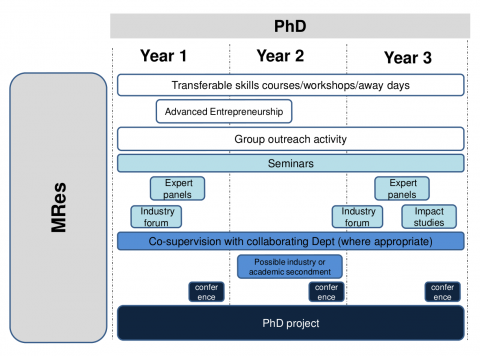Industry+ MRes + PhD scheme
The Industry+ scheme (henceforth I+) is offered in collaboration with industrial partners Arup, a major UK consultant and Laing O'Rourke, a major UK contractor. The essence of the scheme is that some students will spend a year employed by one of these partners before coming to Cambridge to start their MRes+PhD programme. It is therefore a 5-year programme with an I+ year followed by the 1 year MRes + 3 years PhD. This new model for University/Industry partnership and engagement is unique to Cambridge and is designed to better translate Industry needs into research outcomes and provide a smooth transition for PhD graduates into technical leadership careers in Industry. Students applying for the I+ scheme must be eligible to work in the UK.
The I+ scheme provides a framework for a CDT student to combine industrial experience and further academic studies into one experience. During the I+ year students will be part of the company's graduate training programme but will also be supported by the CDT. I+ students will visit Cambridge occasionally to meet with their Cambridge advisor and to engage in training and cohort-bonding activities. Where appropriate, the early stage involvement of potential PhD supervisors will be also encouraged.
After the I+ year, the I+ student follows the same MRes+PhD programme (a 1+3 model with a one year Masters course with taught and research elements followed by a three year PhD) as the non-I+ students. However, in addition the I+ student will return to the I+ partner for targeted graduate training opportunities throughout the MRes+PhD programme. I+ students will be also encouraged to develop PhD proposals in conjunction with the I+ partner and the chosen PhD supervisor.
The first year of the broad cohort-based MRes education will cover core Civil Engineering topics, related disciplines, and research and commercial skills training.

The MRes programme starts with an induction programme and a field trip to visit a mix of construction sites and other sites of engineering and/or historical importance. Students will study 3 bespoke core taught modules specifically designed to cover Civil Engineering theory, Civil Engineering research methods and multidiscipliarity in Civil Engineering. A further 2 elective taught modules can be selected from a list of subjects offered by Engineering and related departments in the University of Cambridge thereby providing a greater awareness of the wider context in which Civil Engineering operates. Students will complete an individual desktop study and a mini-project which are likely to have a strong Industry link. A group project using large-scale Civil Engineering case studies, e.g. Crossrail, High Speed 2, Severn Tidal Power project as well as local projects e.g. North West Cambridge Development will take place over two terms. An Introduction to Entrepreneurship course run by the Judge Business School which covers aspects such as innovation, ethics, entrepreneurship, finance, organisational behaviour and technology strategy and impact studies, is also compulsory. Students will develop their transferable, professional practice and commercial skills through participation in relevant training sessions. A substantial MRes project will be undertaken under the guidance of a CDT Civil Engineering Supervisor and related to the the Future Infrastructure and Built Environment CDT research themes. I+ students are likely to have already identified a Supervisor and a topic aligned to their company's research needs during their I+ year. Students will submit a MRes thesis and present their work at a student-run MRes conference.
The subsequent 3 years specialist PhD training programme will embrace topics ranging from future energy infrastructure to sustainable urbanisation and innovative construction materials.

Core civil engineering research forms the major part of the three years PhD study. PhD students will be expected to publish high-quality journal papers and present their work at international conferences. CDT students will spend around 80-90% of their time on their core research, and the remaining 10-20% of their time will be devoted to bespoke activities which will include a mix of impact studies, possible secondment to an industrial or international academic partner, additional multi-disciplinary components e.g. with a co-supervisor from another Department/division, and advanced professional, personal and commercial skills development. Annual student-run conferences will showcase PhD research, provide networking opportunities and develop communication skills.
Industry partners
At present the following are participating in the I+ scheme, this list may expand in future. To see a full list of industrial and academic partners with which it may be possible to collaborate during the course of your MRes or PhD, please click here.

Our poster for the I+ scheme can be found here.

